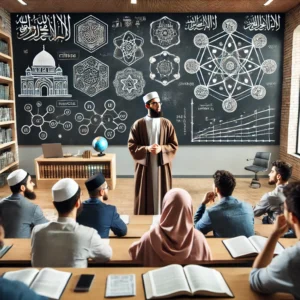The Strategic Role of Muslim Intellectuals in Building Students’ Knowledge

By Dr. Abdul Wadud Nafis, LC., MEI
In the era of globalization and rapid technological advancement, the role of Muslim intellectuals is becoming increasingly vital in shaping the future generation. Intellectuals are not only required to master knowledge but also to integrate moral and spiritual values into the educational process. They serve as catalysts, inspiring students to think critically, innovate, and foster social awareness.
This responsibility encompasses education, mentorship, research, and social engagement, all aimed at developing students who are not only academically intelligent but also possess noble character. In this context, Muslim intellectuals act as a bridge between knowledge and ethics, guiding students to become positive agents of change amidst the challenges of the times. With this spirit, let us delve deeper into the responsibilities of Muslim intellectuals in developing students’ knowledge.
The responsibilities of Muslim intellectuals in the development of students’ knowledge cover several important aspects:
- Education and Teaching: Intellectuals must commit to providing quality teaching, integrating Islamic values into the curriculum, and encouraging students to think critically and analytically.
- Mentorship: Intellectuals play the role of mentors, guiding students in developing their potential both academically and morally.
- Research and Innovation: Intellectuals should be actively involved in research to generate new knowledge that benefits society. They must inspire students to participate in research and innovation.
- Social Engagement: Intellectuals must encourage students to contribute to society by developing social projects that address the challenges faced.
- Character Development: It is essential for intellectuals to shape the good character of students, based on Islamic morals, so that they become responsible leaders in the future.
- Collaboration and Networking: Building networks with other institutions, both locally and internationally, is important to broaden students’ horizons and opportunities.
- Advocacy of Humanitarian Values: Intellectuals must advocate for humanitarian values and social justice in all aspects of knowledge, making students aware of social issues.
By fulfilling these responsibilities, Muslim intellectuals can create a productive and meaningful academic environment, shaping students who are intelligent, ethical, and ready to contribute to the community and the nation.
Through these efforts, Muslim intellectuals not only create a dynamic academic environment but also shape students into leaders of integrity. By combining knowledge, ethics, and service to society, they can produce a generation ready to face global challenges with confidence and wisdom. Let us support the strategic role of intellectuals in creating a better future for the community and the nation.
Bibliography:
1. Al-Attas, Syed Muhammad Naquib. Islam and Secularism. Kuala Lumpur: International Institute of Islamic Thought and Civilization, 1993.
2. Bukhari, Muhammad. Pendidikan dan Kearifan: Menggagas Pendidikan yang Berbasis Nilai-Nilai Islam. Jakarta: Prenadamedia Group, 2010.
3. Hamka. Pendidikan dalam Islam. Jakarta: Bulan Bintang, 1978.
4. Khairuddin, Abdul. “Peran Cendekiawan dalam Pemberdayaan Mahasiswa di Era Modern.” Jurnal Pendidikan Islam 5, no. 2 (2021): 123-140.
5. Nasution, Ahmad. Islam dan Pendidikan: Memahami Konsep Pendidikan dalam Islam. Bandung: Alfabeta, 2009.
6. Shihab, Quraish. Membangun Generasi Cendekiawan Muslim. Jakarta: Lentera Hati, 2004.
7. Supriyadi, Agus. “Cendekiawan Muslim dan Tantangan Pendidikan di Indonesia.” Jurnal Pendidikan dan Kebudayaan 10, no. 1 (2020): 45-60.
8. Syafi’i, Abdurrahman. Etika dan Akhlak dalam Pendidikan Islam. Yogyakarta: Pustaka Pelajar, 2015.


